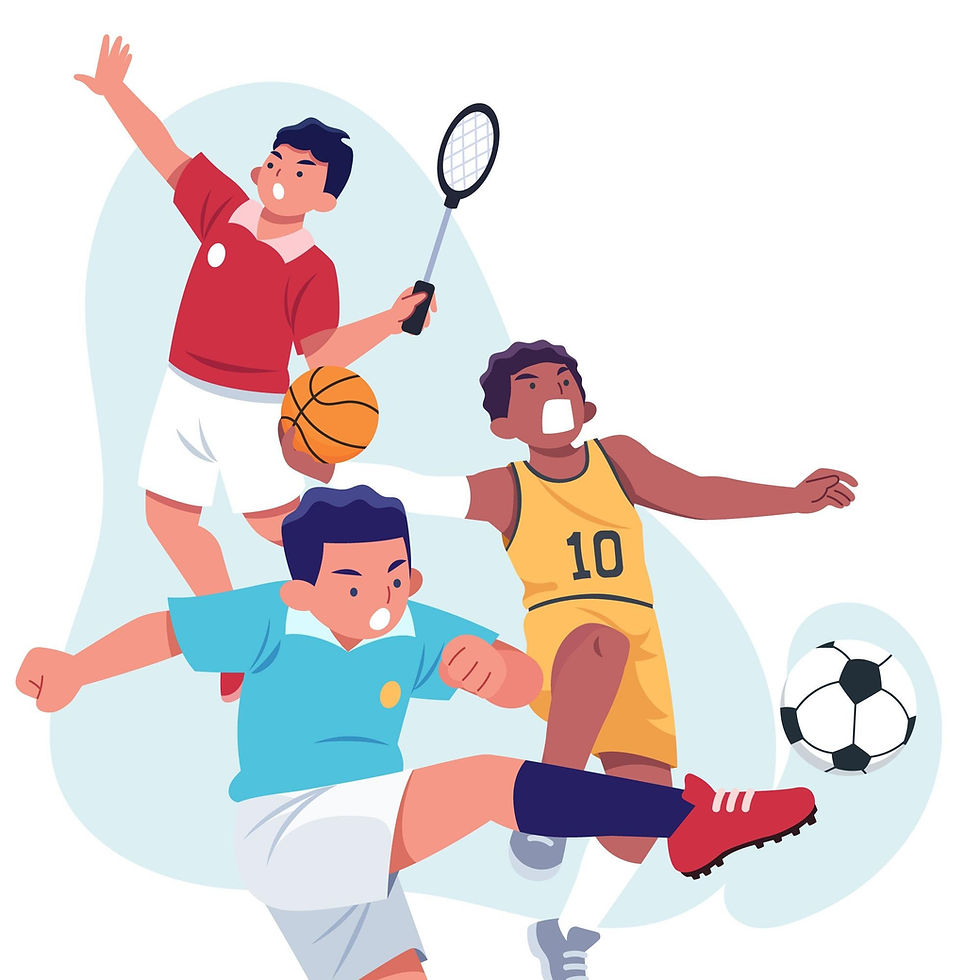Why Games and Sports are necessary part of Education?
- Creative solutions
- Feb 27, 2023
- 4 min read

Games and sports are a necessary part of education. The main aim of education is to develop a mental health of a children properly by providing them basic knowledge which they needed in every stage of their life. Games and sports are most common fundamental way in which human interacts and learn new things. Games and sports provide so many advantages for children of all interests and abilities. Children especially love playing games and these activities provide them a great opportunity to practice so many skills.
As educators, tutors, government’s official, and parents realize the intellectual need and benefits that gaming and sports has on teaching, this educational tool has become mainstream for education. Games and sports are interactive play that teach goals, rules, adaptation, modifications, acceptance, problem solving, interaction, all represented as a story. They satisfy a fundamental need to learn by providing enjoyment, passionate involvement, structure, motivation, ego gratification, adrenaline, creativity, social interaction and emotion in the game itself while the learning takes place.Games and sports are an important form of entertainment for children and adults, through which children organize them independently and have special educational significance. Games and sports are a powerful tool for education because through games children acquire knowledge, enrich their experience, develop feeling of leadership, learn about team work and discipline and develop skills and habits.Different roles in the games allows children to gain personal experience whether it is good or bad, about what is positive and what is negative in their behaviour.
Games as a good learning source
Teachers need to focus on three factors when designing strong learning games. These are:-
Integration
When you play a learning game you need to make sure that learning and play are integrated. This means that to succeed in the game you also need to master the learning goals behind the game. In developing a learning game, one must recognize how integration works both in relation to the verbs in the game and the substantives. Often proponents and newcomers to the field of learning are distracted by the seeming overlap in substantives and their curriculum. For example,game with a historical strategy that covers the same contents found in many syllabus, through these types of games, students will learn history in a interesting way. But on closer examination, very often the substantives, and especially the verbs, in these historical strategy games are less than a perfect match with the learning goals in schools.
Motivation We need to make sure that the game is as intrinsically motivating as possible. The actual key activity in the game must be interesting and engaging.
Motivation should be in tune with the requirements of good gameplay like good balancing, a well tuned rewards system, varied consequences, and quick user feedback. This can also be summarized into the concept of "challenge." When a player experiences motivation they are challenged, which is the consequence of a number of underlying variables working well. Feedback is quick, precise and relevant when delivered to the player. A good learning game succeeds when it does not become void of meaning, when there is motivation.
Focus The final element is the game's focus. Sometimes you will have many relevant verbs and substantives, but if the game's focus is off then you may only encounter them rarely, or not at all. Again it makes sense to remember to differentiate between substantives and verbs. You can be focused in the learning experience by exploring, operating and interacting within a setting like a historical map or a historical city. However for focus to be optimal during the learning experience it needs to be supplemented by working with the verbs.
Learning while playing
Playing is very important to a child's development, it is an integral part of a child's Early Years Foundation Stage and supports their learning journey too. Young children can develop many skills through the power of play. They may develop their language skills, emotions, creativity and social skills. Playing helps to nurture imagination and give a child a sense of adventure. Through this, they can learn essential skills such as problem solving, working with others, sharing and much more.
In turn, this helps them develop the ability to concentrate. Providing children with a range of playthings will help them learn in a number of ways:Sand and water play can be an early introduction to science and maths, for example learning that water is fluid, not solid, and that it can be measured in different sized containers.
Playing with dough or clay, drawing and painting pictures, dressing up, playing with dolls can encourage creativity, imagination and expression of feelings.
Building blocks, jigsaws and shape sorters can help with recognising different shapes and sizes, putting things in order and developing logic.
Playing ball games, dancing, running, climbing all help to develop body movement, strength, flexibility and co-ordination skills.
Games help with turn taking, sharing and mixing with others.
Singing, playing simple music instruments help to develop rhythm, listening and hearing.
It's important that learning is fun at this age. It needs to be about doing things with them that they like. They might find unusual ways of doing things - for a toddler, building blocks aren't just for making towers, and paint can be used without a brush! Show them how things work, but if they want to experiment, let them.
Children learn through all their senses through taste, touch, vision, hearing and smelling. They will watch those around them and copy language and behaviour.
Don't push your child too hard. Children develop in their own ways and in their own time. Try not to compare them to other children.
#sports #football #sport #fitness #basketball #nfl #nba #soccer #training #gym #workout #baseball #motivation #athlete #mlb #follow #love #bhfyp #instagood #instagram #fit #like #fashion #nike #photography #espn #hockey #life #running #tutor #hometutor #privatetutor #hometuition


Comments